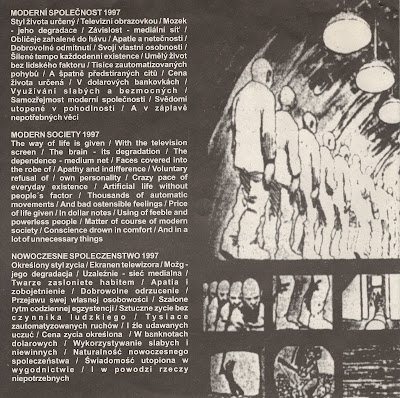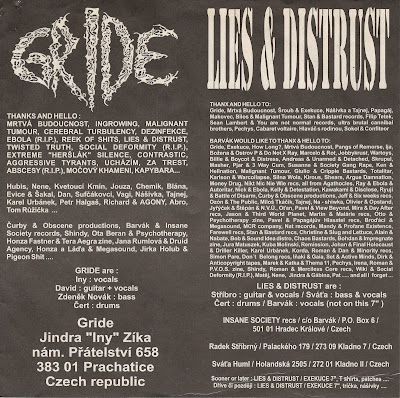What could be more embarrassing than wearing a shirt saying "good girls go to Heaven, bad girls go to PRAGUE"? I remember a group of extremely pissed and obnoxiously loud Australian ladies visibly on a hen do all wearing such tasteful tops in the town centre and consciously vomiting on every street corners. The noise and the bilious yellowish ponds made them relatively easy to avoid - which was the reasonable thing to do - but the spectacle was insidiously compelling. The locals managed to remain stern and stoic, probably accustomed to such distasteful tomfooleries and were far beyond consternation at this point. Fuck knows if this locust-like group of destruction was going on the rampage all over Europe or if they specifically picked Prague as the epicenter of their own chaos. It made the Play Fast or Don't festival that I was going to look like a garden party among decent people. Who said punks could not be well behaved? Well kind of.
Contrary to its neighbour Poland, from an outsider's point of view, Czech never seemed to produce as many bands that got to cross the borders in terms of notoriety. Comparing countries is often irrelevant as it does not take into account specific histories and contexts that inform the production of music and formation of bands, even if said countries are apparently close culturally and historically. Sometimes local dynamics can only escape and elude people from the outside. France is a case in point. We have been consistently shit at hardcore punk music contrary to Italy, Spain or Germany because rock culture has long been abysmal in the country. However we did alright with dodgy oi, self-obsessed depressive dark-wave and emocore- quite obviously - and we have one of the best hip-hop scenes in the world (or so I have heard because it is hard to believe judging from the dross that my 18 year old neighbour is blasting on a weekly basis... I mean what's with the fucking vocoder everywhere?). But if you don't live in France, you wouldn't know the reason why there were so few hardcore bands. So comparisons could be pointless to an extent even if the ties between two countries (like Poland and Czech or, for obvious reasons, Slovakia and Czech) were strong during the 90's (notably with the labels Malarie Records and Insane Society Records), which is the period I am interested in.
When I started to think about the series, I wanted to write about a Czech record because I don't often review Czech records, a pretty simple argument I admit. At first I though that I did not know that many 90's hardcore punk bands from there and then, after a couple of cups of coffee and a closer look at the collection, I realized that the scene was more prolific than I initially imagines. Czech punks love fast music so it is no coincidence that grindcore and fastcore have been popular genres over there since the early 90's, the well-respected, well-known and still active (!) Malignant Tumour being the best example of this phenomenon and a band like See You in Hell certainly stuck too. I am not an expert in grindcore or super fast hardcore in general so I would be at a loss to assess how big and well-liked the Czech scene is but with a solid culture of extreme music festivals (like the Obscene Extreme of course) I suppose that there are large segments of the scene I am not even aware of and I have learnt to be at peace with the idea that I will never be an omniscient übermensch.
Now that is just unkind.
But to get back to subgenres that are my bread and butter and that I pride myself in being a gentleman connoisseur, namely anarchopunk and crust, not many names came out beside How Long?, CulDeSac, Exekuce and Lies & Distrust (other bands like Nonconformist or Coexist were from the other side of the border). On one hand, this kind of categorizations does not make much sense in the context of the time and petty classifications do not reflect scene dynamics. More often than not, whether you play hardcore or crust or grindcore don't necessarily really matter, what does is the sense of togetherness, solidarity and belonging. On the other hand, you also have to look at the music itself and how certain bands captured the global vibes of the time and crust was very prominent at the time. The choice of the split Ep between Gride and Lies & Distrust was an easy one: Gride exemplified what fast Czech hardcore sounded like in the 90's and L&D were a great example of the typical eurocrust sound that went well beyond the country's borders. The Ep is therefore relevant for two complementary reasons.
As I remember Gride were rather well-known back in the early 00's when I started dignifying the Paris scene with my exquisite presence. As I mentioned I was never a grind head but I heard the name enough to understand that the band was good (I cannot remember but they must have played here) and one of their Lp, 2003's Tanec Bláznů, was released on two French labels. However, before getting this Ep rather recently in my quest to create a comprehensive 90's crust library - to my mum's dismay - I don't think I had actually spent the time to properly listen to the band. I was expecting something much grindier and, while there is of course a grindcore influence, Gride were not an all out noisecore blasting machine. The primitive, straight-forward angry punk sound really works here and makes the songs very dynamic and energetic (the coconut-sounding drums are too loud though). The five songs are very enjoyable and are completely metal-free as Gride in the late 90's were first and foremost a raw grinding hardcore band rather than what we understand as grindcore today (often far too technical). The vocals are aggressive and rather classical in conception but don't feel too forced and I am reminded of their compatriot Mrtvá Budoucnost but not as blast beats oriented and on the whole of the punkier side of grindcore and bands like Intestinal Disease, Proyecto Terror or Wojczech. The band would change throughout the year and the split Ep reflected what they started out as, as a young band with this early lineup. Gride kept going and are still active although I have no idea what they sound like today.
On the other side L&D offer four songs of, well, classically executed raw cavemen crust. I could almost stop the description here since by now, after years of reading Terminal Sound Nuisance, you probably know exactly what I mean by that. But I am paid by the word and with the inflation and all that (have you seen the shipping prices recently? Buying records is turning into a luxury, even for first-world twats like myself) I just have to keep writing. I don't dislike the name Lies & Distrust and it could summarize adequately the programs of most of the current political parties but it is a but long indeed. I would have gone directly for Distrust because at that time in the mid 90's no one really knew about the 80's Swedish band (beside käng nerds I suppose) and I have no idea who that Ohio punk band was (thank you Discogs). I like the logo though as I am a simple man of simple pleasures. The popularity of the band today is pretty much non-existent and only crust old-timers would remember them at all. All my attempts to start a conversation about L&D have miserably failed for some reason and mentioning you love lies and distrust on a dating website is also a major faux pas. So let's say I am, once again, standing for the little man here.
Musically L&D is everything you can expect from a young 90's European crustcore band. The production is not exactly crystal clear and you cannot really hear anything but the cymbals and the gruff vocals. Don't get me wrong, it still sounds very energetic and punishing but in a very DIY punk-as-fuck passioante cheap way which often goes hand in hand with 90's crust and even defines it. What they lack in production L&D make up with aggression and hyperbolic crustness. As the cradle of Eurocrust, early Hiatus is the major ingredient of course and I can also hear a Polish crust influence, like Infekcja and Silna Wola, but there is also a distinct grindcore influence popping up from time to time as if they couldn't really help throwing a couple of blast beats to keep the locals awake. The same year the band would contribute three songs (with a slightly more balanced production) on another split Ep with another crusty Czech band Exekuce (with whom they shared a member) and in 1999 Shit Records (yes) would release a split Lp between l&D and Dischord from Brazil.
The record comes with a pretty big booklet (that is a bit of a mess and I struggled to put all the pages in the correct order) with the lyrics and translations showing how political the period was. This split Ep was released on Insane Society, a long-established label run by Barvák who took over the vocals in L&D after the present split (he's actually mentioned as the new singer in the credits). By the time of the band's demise, two members formed the tighter gruff crust band Dread 101 (that we will see on the blog sooner than later).














Great post. Yes, the Czech scene is crazy and I'm not surprised in a grind/crust split with people coming from that place, they have this strong punk attitude in a lot of grind bands there. Keep on your very well done work in here, it's a pleasure to discover some gems and reading about it as how everything is so well written. Thank you.
ReplyDelete